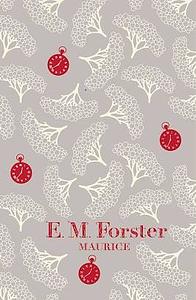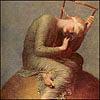Take a photo of a barcode or cover
emotional
hopeful
sad
Plot or Character Driven:
Character
Strong character development:
Yes
Loveable characters:
Complicated
Diverse cast of characters:
No
Flaws of characters a main focus:
Yes
Graphic: Homophobia, Suicidal thoughts, Classism
Moderate: Suicide
Minor: Death, Sexual content
Another country: in the 1980s, every limpid youth with a fey manner had a poster of Rupert Everett on the bedroom wall in his student digs and held Merchant-Ivory's sumptuous Maurice to be his favourite film. I, too, gentle reader, was swept up in such juvenalia, and I suppose it was the feint of embarrassment that kept me from the source novel so long. It has also been derided as the slightest of Forster's books, perhaps covert homophobia since while it's undoubtedly slim it is far from a little book. Forster's usual concerns - class and shame - are here of course, and he is unerring in his portrayal of middles and upper middles and their interactions with common people. But at its heart is a touching if slightly fantastic (and fantasised) love story which I've no doubt Jacob Rees-Mogg tried to reenact at his public school. Forgetting that distressing image of the Tory Party's Mr Logic enjoying Uranian love, the last words of Scudder, the Mellors to Maurice's Lady C, linger in the mind: (West Country accent) "and now we shan't be parted no more, and that's finished." Happy ever after, and for once, who can demur?
challenging
dark
emotional
hopeful
reflective
sad
slow-paced
Plot or Character Driven:
Character
Strong character development:
Yes
Loveable characters:
Yes
Diverse cast of characters:
Yes
Flaws of characters a main focus:
Yes
This was a beautifully haunting book.
I’m so glad it has a <spoiler happy ending.
The last few chapters I was brimming ear to ear.
Granted, I needed to look up a slew of words (older English, some chiefly British which I am not). That made the reading a bit slow going, and there are some passages I may not ever fully understand (like Clive’s speeches).
The end note is quite interesting.
I appreciate that Maurice is a character who is gay (gayness is not his entire identity).
I didn’t realize until the end—it was so well done—but how Penge’s increasing dilapidation reflects Clive, who I believe has chosen, due to societal pressures, to suppress his homosexuality.
I’m so glad it has a <spoiler happy ending.
The last few chapters I was brimming ear to ear.
Granted, I needed to look up a slew of words (older English, some chiefly British which I am not). That made the reading a bit slow going, and there are some passages I may not ever fully understand (like Clive’s speeches).
The end note is quite interesting.
I appreciate that Maurice is a character who is gay (gayness is not his entire identity).
Minor: Suicidal thoughts
emotional
hopeful
reflective
sad
medium-paced
Plot or Character Driven:
Character
Strong character development:
Yes
Loveable characters:
Complicated
Diverse cast of characters:
Complicated
The language of the book makes the occasionally stumble in the story excusable; there are some really lovely and well-put passages.
emotional
hopeful
reflective
sad
slow-paced
Plot or Character Driven:
Character
Strong character development:
Yes
Loveable characters:
Complicated
Diverse cast of characters:
Complicated
Flaws of characters a main focus:
Yes
I was drawn to Maurice by E. M. Forster after reading that the author secreted his novel away beneath his bed for seventy years or so, and felt so blue to discover it was published a year after his death, since homosexulity was outlawed during the period it was written. Attracted by Forster's notoriety of being the founder of modern gay fiction and the knowledge that his novel didn't succumb to a tragic ending, I ventured into Forster's work for the first time.
There's no doubt that he's a fluent and perspicacious author, penning a profound tale driven by morally-grey characters. It's evident how much he cared for them, especially Maurice, and how much of his heart he poured into this piece of fiction. He balanced discussion on class and social criticism with candour and an inspirational vehemence, showing intellect but also emotional empathy when it came to love, intimacy, and exploring sexuality. His capacity to perceive the turmoil of his characters emotions is enviable, and while deep and poignant in many ways, there's a certain levity to the dialogue at times that I appreciated immensely.
I was bewildered, at first, to discover that it was almost completely a romance of pure yearning and the agony of unrequited love and how the true stirring and ennoble love story blossomed only at the very end. I wish the reader had gleaned some greater insight to Maurice's and Alec's relationship, as the novel concluded somewhat prematurely to truly experience the depth of their adoration for one another, however witnessing Maurice close the door on his past was cathartic in its own right.
Forster's work is a quiet rebellion against criminalising free love, and how love between same-sex partners is pure and tender and true, exalting that it is transcendent and chasmic, perhaps more virtuous than heterosexual partnership on some levels, especially in a era where marriage between aristocrats was mostly beneficial financially, and love between the same-sex often endured financial or societal ruin, as experienced through Maurice and Alec, lovers from vastly different classes, and how the antiquity of this love can be seen through the work of ancient philosophers in profound and commendatory ways, and the perils of academics censoring such wisdom.
I have an incredible amount of respect for Edward Carpenter, who largely inspired the novel, and I love how Forster found acceptance of his sexuality through Carpenter and his lover.
The constant symbolism of tainted beauty, night, and day was breathtaking
There's no doubt that he's a fluent and perspicacious author, penning a profound tale driven by morally-grey characters. It's evident how much he cared for them, especially Maurice, and how much of his heart he poured into this piece of fiction. He balanced discussion on class and social criticism with candour and an inspirational vehemence, showing intellect but also emotional empathy when it came to love, intimacy, and exploring sexuality. His capacity to perceive the turmoil of his characters emotions is enviable, and while deep and poignant in many ways, there's a certain levity to the dialogue at times that I appreciated immensely.
I was bewildered, at first, to discover that it was almost completely a romance of pure yearning and the agony of unrequited love and how the true stirring and ennoble love story blossomed only at the very end. I wish the reader had gleaned some greater insight to Maurice's and Alec's relationship, as the novel concluded somewhat prematurely to truly experience the depth of their adoration for one another, however witnessing Maurice close the door on his past was cathartic in its own right.
Forster's work is a quiet rebellion against criminalising free love, and how love between same-sex partners is pure and tender and true, exalting that it is transcendent and chasmic, perhaps more virtuous than heterosexual partnership on some levels, especially in a era where marriage between aristocrats was mostly beneficial financially, and love between the same-sex often endured financial or societal ruin, as experienced through Maurice and Alec, lovers from vastly different classes, and how the antiquity of this love can be seen through the work of ancient philosophers in profound and commendatory ways, and the perils of academics censoring such wisdom.
I have an incredible amount of respect for Edward Carpenter, who largely inspired the novel, and I love how Forster found acceptance of his sexuality through Carpenter and his lover.
The constant symbolism of tainted beauty, night, and day was breathtaking
emotional
hopeful
reflective
medium-paced
Plot or Character Driven:
Character
Strong character development:
Yes
Loveable characters:
Yes
Diverse cast of characters:
No
Flaws of characters a main focus:
Yes
challenging
emotional
reflective
slow-paced
Plot or Character Driven:
Character
Strong character development:
Yes
Loveable characters:
Complicated
Diverse cast of characters:
Yes
Flaws of characters a main focus:
Yes
challenging
emotional
hopeful
inspiring
reflective
medium-paced
Plot or Character Driven:
Character
Strong character development:
Yes
Loveable characters:
Complicated
Diverse cast of characters:
No
Flaws of characters a main focus:
Yes
A product of its time. However for that same reason it’s also Maurice’s biggest charm & why its appeal endures.
First of all, this is a gay story from 1914!!! It's great to see older books about gay characters, especially a century ago. But it's also sad to see that some of the problems that Maurice went through are still very real for many LGBT+ people in the world today, especially the feeling that it's wrong to be queer and it's something that should be cured.
Maurice receives 3 stars from me for a few reasons, even though it's needed representation. First, it wasn't exactly an easy reading, not because of the vocabulary, but because of the way the dialogs were written. I had to re-read some of them several times and still lost track of who was saying what at some points. The second point is the classism, obviously expected in a book from the 1900s and I kept that in mind during my reading, but it still bothered me seeing how Maurice was misogynist and how the lower classes of old (just old?) England were regarded.
Now, the highest point for me, unfortunately I think, was the representation of someone who had to come to terms with feelings that are not accepted either in society (or in any closer group, like family, religion, …). Every LGBT person has gone through this and reading that just touches this spot.





